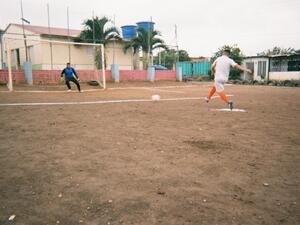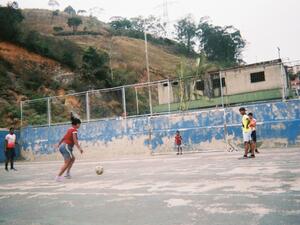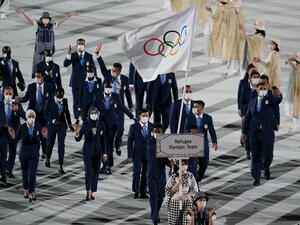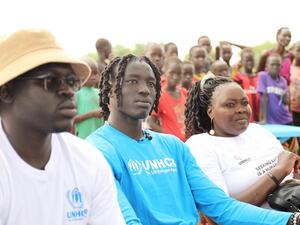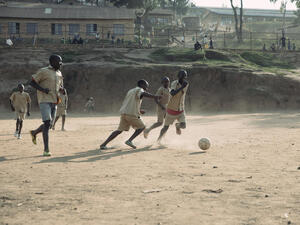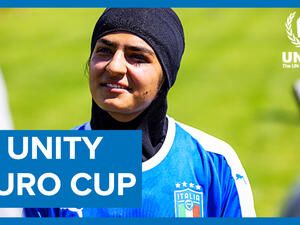Q&A: Refugee sport programmes help regain lost childhood
Q&A: Refugee sport programmes help regain lost childhood
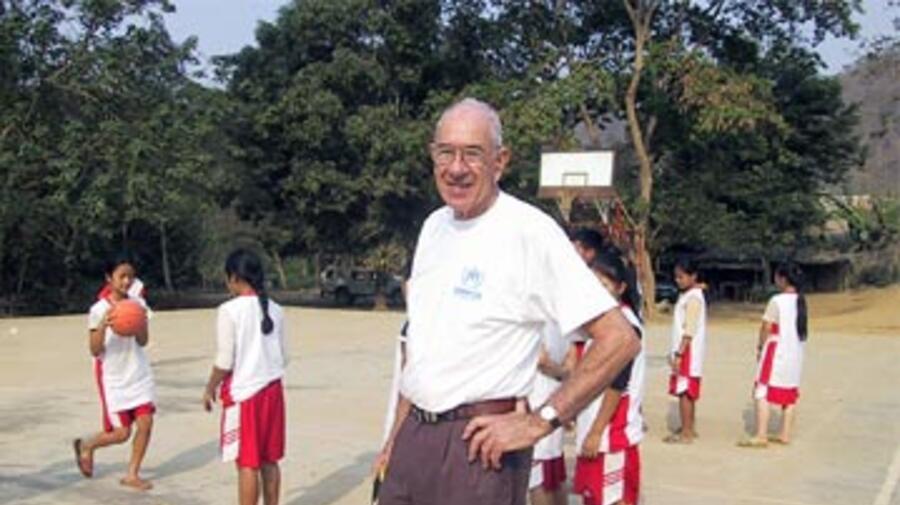
Claude Marshall, voluntary consultant on refugee sport.
GENEVA, March 2 (UNHCR) - Claude Marshall has been a full-time volunteer consultant at UNHCR for the past 14 years, helping tens of thousands of refugees around the world. The 74-year-old Marshall volunteered his services at UNHCR headquarters after retiring as European vice-president for a major international advertising and public relations firm. Much of his work since then has focused on raising public awareness and private sector support for sport and education programmes for refugee children. Marshall is preparing to hand over to a full-time successor, thus ensuring that the programmes he started will continue to benefit refugee children. He sat down with UNHCR spokesman Ron Redmond to discuss his volunteer work and the future of the programme he began. Excerpts from the interview:
You have worked full time for UNHCR for 14 years without a salary. Why?
I was a refugee myself as a child. I was born in 1932 in Heidelberg, Germany. Fortunately, my father saw the writing on the wall and managed to take us to the United States to escape the Nazi persecution of the Jews. UNHCR has given me the opportunity to give something back to the refugee cause - remembering that when my family landed in New York in 1936, we were refugees with no money, no home, but a lot of hope, and that worked out. Now I want to give refugee children that same kind of hope.
What brought you to UNHCR?
When I retired in 1993, I wanted to find a worthwhile cause in which I could use my background and experience. Fortuitously, I met former High Commissioner Sadako Ogata at a dinner. I told her a bit about myself and explained that UNHCR sounded ideal, and that I wanted no salary - just a chance to do something for refugees. With that she said, "You are hired."
What role do sport programmes play in the lives of refugee children?
Sport can help young refugees regain a valuable part of their lost childhood. Refugee children have often suffered enormously, leaving them severely traumatised. They have witnessed war and persecution first hand. Many have been forcibly recruited as child soldiers, or been victims of sexual violence. They may have seen their parents murdered, or were separated from them in the panic and chaos of fleeing. The trauma does not end when they finally make it to a refugee camp. Some refugee children are born in camps and many spend most of their growing years in such places, often with no access to sport or recreation. Children have a right to play; a need to play. Sport provides them with a semblance of normality and some structure to their lives. It provides many psycho-social benefits and gives them an outlet for channelling their energy in a positive way that can benefit them for the rest of their lives. This is especially valid for children fleeing from conflict situations. Sport develops tolerance, cooperation, an appreciation of rules. It motivates refugee children to attend camp schools, which is particularly important for girls who are all too often left out. It helps children regain a childhood lost.
Can you give us some examples of the programmes you've developed?
We have done a lot with the International Olympic Committee (IOC), including fixing playing fields and supplying sport equipment for refugee kids in Tindouf, Algeria. In Burundi, we levelled football pitches and supplied sport equipment. In Zambia and Zimbabwe, we supported community schools with the IOC. We ran team sports for girls in Kakuma, Kenya and in Nepal - programmes aimed at keeping them in school. Similar IOC-funded projects are again under way this year in Ecuador, Colombia and Nepal.
We also have a programme with the International Volleyball Federation in which we've provided volleyballs and nets to refugee and displaced children in East Timor, Sri Lanka, Yemen and South Sudan. We've teamed up with the International Basketball Federation to build basketball courts in camps in Tanzania and Uganda, and with the International Badminton Federation to provide equipment to refugee kids in Thailand. We also have several current programmes with Right to Play, a sport NGO that sends trainers to many of the camps to work with refugee children. So there's a lot going on, but much more to be done.
How do you see the future of the refugee youth sport programme?
Sport and education are vital for refugee kids, but with some 21 million people of concern worldwide - around half of them children - UNHCR understandably has to channel its meagre resources to the most pressing, life-saving needs. While I've been overseeing this work until now, I think the next step is to hand it over to a professional, full-time refugee sport coordinator whose position is supported entirely by one recognised outside donor.
I'm 74 years old and while I intend to continue to help when I can, it's obvious that the function has now reached a level that requires a full-time leader who can plan and implement more sport programmes and enlist even more partners to work with us to help millions of refugee children. We'd like the refugee sport coordinator position to be something like an established chair at a university, funded by a single donor. We have already identified a number of well-qualified candidates and are now looking for a donor who believes, as we do, in the importance of sport and education for refugee children.
What will it require to establish the refugee sport coordinator position?
We would like to see a minimum donor commitment over three years to cover an annual budget of between US$175,000 to US$200,000, covering the coordinator's salary, field travel and some start-up funds for new camp projects. To help move the project forward, we would like to see the donor involved in the selection process of the new coordinator as well.
What has your work at UNHCR meant to you personally?
Since I began in 1993, UNHCR has kept me immersed in interesting issues and given me a chance to work on a variety of worthwhile projects with individuals and organisations committed to providing sports programmes for kids in refugee camps who would otherwise have had no such opportunities. I am extremely grateful for the opportunity and for the support we've received over the years from UNHCR staff in some of the most difficult places on earth. Now we just need to ensure that the work continues.

